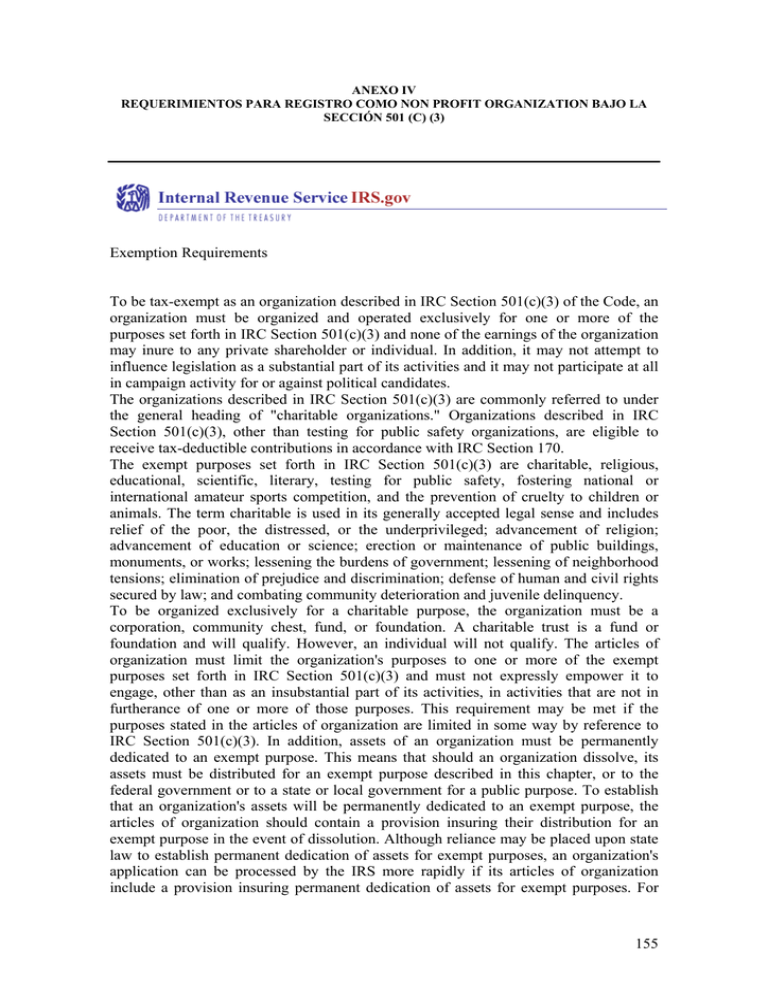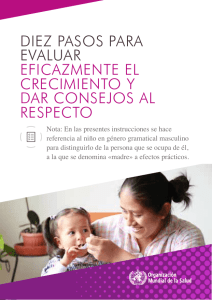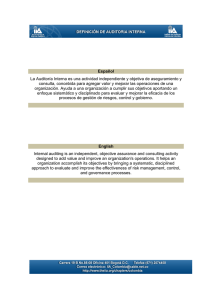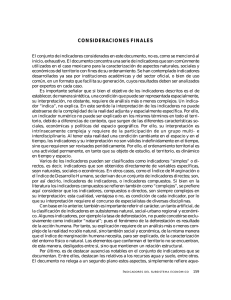en otra ventana
Anuncio

ANEXO IV REQUERIMIENTOS PARA REGISTRO COMO NON PROFIT ORGANIZATION BAJO LA SECCIÓN 501 (C) (3) Exemption Requirements To be tax-exempt as an organization described in IRC Section 501(c)(3) of the Code, an organization must be organized and operated exclusively for one or more of the purposes set forth in IRC Section 501(c)(3) and none of the earnings of the organization may inure to any private shareholder or individual. In addition, it may not attempt to influence legislation as a substantial part of its activities and it may not participate at all in campaign activity for or against political candidates. The organizations described in IRC Section 501(c)(3) are commonly referred to under the general heading of "charitable organizations." Organizations described in IRC Section 501(c)(3), other than testing for public safety organizations, are eligible to receive tax-deductible contributions in accordance with IRC Section 170. The exempt purposes set forth in IRC Section 501(c)(3) are charitable, religious, educational, scientific, literary, testing for public safety, fostering national or international amateur sports competition, and the prevention of cruelty to children or animals. The term charitable is used in its generally accepted legal sense and includes relief of the poor, the distressed, or the underprivileged; advancement of religion; advancement of education or science; erection or maintenance of public buildings, monuments, or works; lessening the burdens of government; lessening of neighborhood tensions; elimination of prejudice and discrimination; defense of human and civil rights secured by law; and combating community deterioration and juvenile delinquency. To be organized exclusively for a charitable purpose, the organization must be a corporation, community chest, fund, or foundation. A charitable trust is a fund or foundation and will qualify. However, an individual will not qualify. The articles of organization must limit the organization's purposes to one or more of the exempt purposes set forth in IRC Section 501(c)(3) and must not expressly empower it to engage, other than as an insubstantial part of its activities, in activities that are not in furtherance of one or more of those purposes. This requirement may be met if the purposes stated in the articles of organization are limited in some way by reference to IRC Section 501(c)(3). In addition, assets of an organization must be permanently dedicated to an exempt purpose. This means that should an organization dissolve, its assets must be distributed for an exempt purpose described in this chapter, or to the federal government or to a state or local government for a public purpose. To establish that an organization's assets will be permanently dedicated to an exempt purpose, the articles of organization should contain a provision insuring their distribution for an exempt purpose in the event of dissolution. Although reliance may be placed upon state law to establish permanent dedication of assets for exempt purposes, an organization's application can be processed by the IRS more rapidly if its articles of organization include a provision insuring permanent dedication of assets for exempt purposes. For 155 examples of provisions that meet these requirements, download Publication 557, TaxExempt Status for Your Organization. An organization will be regarded as "operated exclusively" for one or more exempt purposes only if it engages primarily in activities which accomplish one or more of the exempt purposes specified in IRC Section 501(c)(3). An organization will not be so regarded if more than an insubstantial part of its activities is not in furtherance of an exempt purpose. For more information concerning types of charitable organizations and their activities, download Publication 557. The organization must not be organized or operated for the benefit of private interests, such as the creator or the creator's family, shareholders of the organization, other designated individuals, or persons controlled directly or indirectly by such private interests. No part of the net earnings of an IRC Section 501(c)(3) organization may inure to the benefit of any private shareholder or individual. A private shareholder or individual is a person having a personal and private interest in the activities of the organization. If the organization engages in an excess benefit transaction with a person having substantial influence over the organization, an excise tax may be imposed on the person and any managers agreeing to the transaction. IRC section 501(c)(3) organizations are restricted in the amount of political and legislative (lobbying) activities they may conduct. For a detailed discussion, see Political and Lobbying Activities. For further information regarding lobbying activities by charities, see the article Lobbying Issues; for more information regarding political activities of charities, see the FY-2002 CPE topic Election Year Issues. http://www.irs.gov/charities/charitable/article/0,,id=96099,00.html?FACTNet 156 F.A.C.T.Net (Fight Against Coercive Tactics Network) ["Lucha Contra Tácticas Coercitivas en la red de computadoras, por sus siglas en inglés"] es una fuente de noticias sin fines lucrativos, un servicio de referencias, y archivos. Traducido por David García Los párrafos siguientes son extractos del 501(c)(3): "Para ser una organización exenta de impuestos como la descrita en el § 501(c)(3) del Código, una organización debe estar organizada y debe operar exclusivamente para uno o más de los propósitos presentados en el § 501(c)(3) y ninguna de las ganancias de la organización puede habituar a ningún accionista privado o individuo. En adición, no puede intentar influir en la legislación como parte sustancial de sus actividades y no podrá participar en lo absoluto en las actividades de campañas a favor o en contra de los candidatos políticos." " Los propósitos para la exención presentados en el § 501(c)(3) son caritativos, religiosos, educativos, científicos, literarios, probar la seguridad pública, auspiciar la competencia nacional o internacional de los deportes aficionados, y la prevención de la crueldad contra los niños o animales. El término caritativo se usa en su sentido legal y es generalmente aceptado e incluye el alivio para los pobres, los afligidos, o el menesteroso; el avance de la religión; el avance de la educación o la ciencia; la erección o mantenimiento de edificios públicos, monumentos, o obras; disminuir las cargas del gobierno; disminuir las tensiones de la vecindad; la eliminación de prejuicio y discriminación; asegurar por ley la defensa de los derechos humanos y combatir el deterioro en la comunidad y la delincuencia juvenil. " La organización no debe organizarse o operarse para el beneficio de los intereses privados, tales como el del creador o la familia del creador, o los accionistas de la organización, u otros individuos designados, o personas controladas directamente o indirectamente por los tales intereses privados. Ninguna de las ganancias netas de una organización § 501(c)(3) puede habituar a ningún accionista privado o individuo. Un accionista privado o un individuo es una persona que tiene un interés personal y privado en las actividades de la organización. Si la organización se compromete en una transacción de beneficio en exceso con una persona que tiene influencia sustancial sobre la organización, un impuesto se le podrá imponer a la persona y cualquier gerente que acepte la transacción ". http://www.factnet.org/501_c_3_Spanish.html?FACTNet 157




